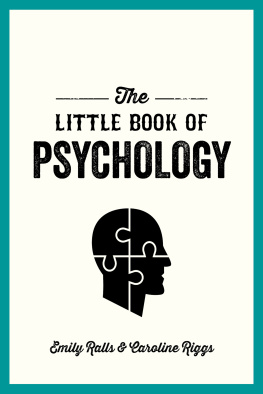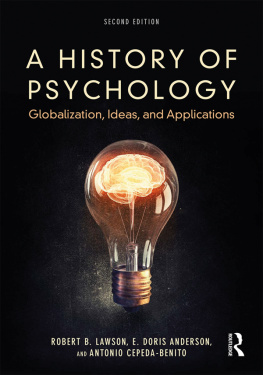STERLING and the distinctive Sterling logo are registered trademarks of Sterling Publishing Co., Inc.
2014 Wade E. Pickren
All rights reserved. No part of this publication may be reproduced, stored in a retrieval system, or transmitted, in any form or by any means (including electronic, mechanical, photocopying, recording, or otherwise) without prior written permission from the publisher.
For information about custom editions, special sales, and premium and corporate purchases, please contact Sterling Special Sales at 800-805-5489 or specialsales@sterlingpublishing.com.
Foreword
The mind is its own place, and in itself can make a heaven of hell, a hell of heaven.
John Milton, Paradise Lost, 1667
Over forty years ago, I conducted an experiment that haunts me to this day. While exploring the question, Under what circumstances does evil arise? I watched college student volunteers readily commit acts of cruelty during a simple role-playing exercise at a mock prison in the basement of Stanford University. In fact, witnessing the dramatic behavioral and psychological transformations in these predominately white, middle-class young men following their random assignment of prisoner or guard, I was forced to terminate the planned two-week long experiment after only six days. That study, along with Stanley Milgrams earlier demonstration of the extent to which the vast majority of ordinary adult citizens could be led to being blindly obedient to unjust authority, illustrated in dramatic fashion the pervasive power of situational forces over individual dispositional propensities.
The abuses committed at Abu Ghraib decades later (in 2004) have given the Stanford prison experience added validity. In my 2007 book The Lucifer Effect, I drew comparisons between the two situations, shedding light on the psychological dynamics at when such pronounced power disparities are evoked. These dynamics include deindividuation, obedience to authority, self-justification, rationalization, and dehumanization. The latter, in particular, is central in the transformation of normal individuals into indifferent or even wanton, prejudiced perpetrators of evil. In addition to investigating the forces that generate the evil of action, I have been as interested in understanding the forces within people and situations that lead to the evil of inaction, public apathy, or indifference to the suffering of others, the bystander effect in emergency situations or in bullying settings.
I have spent much of my professional career studying the psychology of evil, and the reason I have done so is also a testament to the power of the broader Situation shaped in part by evil-generating Systemic forces. Growing up in poverty in the South Bronx ghetto, New York City, during the years of the Great Depression, shaped much of my outlook on life and my priorities. Urban ghetto life is all about surviving by developing useful street smart strategies. That meant figuring out who had the power that could be used against you or to help you, whom to avoid or to whom you should ingratiate yourself. It meant deciphering subtle situational cues for when to bet and when to fold, for creating reciprocal obligations. Most importantly for me as a scrawny, sickly kid was figuring out what it took to make the transition from being a passive follower to a dynamic leader by observing both types in various settings. Once I knew those key behavioral and stylistic differences, it was easy for me to always be the leader, the captain, or the chosen and elected president (even of the American Psychological Association).
In those days, ghetto life was about people without possessions. Some of these kids became victims or perpetrators of violence; some kids I thought were good ended up doing some really bad things, in part because they were seduced by older guys whose job it was to get the kids to do bad things in order to get some money, such as selling drugs, stealing for them, or even selling their bodies. It seemed clear to me that the difference between those kids and my other friends who did not cross the line between good and evil was that those who could maintain positive values were more likely to come from intact families where there was a father present at least much of the time.
But even for us mostly good kids, there was a ritual of coming of age on East 151st Street. As part of the gang initiation process we all had to steal from the grocery store, fight against another kid who was the newer recruit, do some daring deeds, and intimidate people. In our minds, none of what we did was evil or even bad; we were merely obeying the group leader and conforming to the norms of the gang. With such rearing, its obvious where my curiosity about the corrupting power of authority comes from, as well as my lifelong mission to oppose it openlyincluding challenging the political powers that have forced our nation into unnecessary immoral wars in Vietnam and Iraq.
My former colleague at the American Psychological Association, historian Wade Pickren, has put together an amazing collection of historical milestones in the study of mind and behavior that gives readers a broader, more meaningful context to the events that unfolded in that basement at Stanford University more than forty years ago. Of course, this unique reader does much more than thatit offers us a vibrant historical context for appreciating much that makes up the Human Condition. From prehistoric times, we humans have sought to better understand each other and ourselves. Concerning a persons propensity for cruelty, explanations have ranged from possession by evil spirits, to an imbalance of humors, to antisocial personality disorder. In the twentieth century, aggressive impulses were traced to psychosexual complexes or excess neuronal activity in the brains amygdala. Certainly, violence results from a complex interplay of biological, psychological, and environmental factors, but an extensive body of research has shown that immediate situational forces are more powerful than we acknowledge in shaping our behavior in many contexts.








